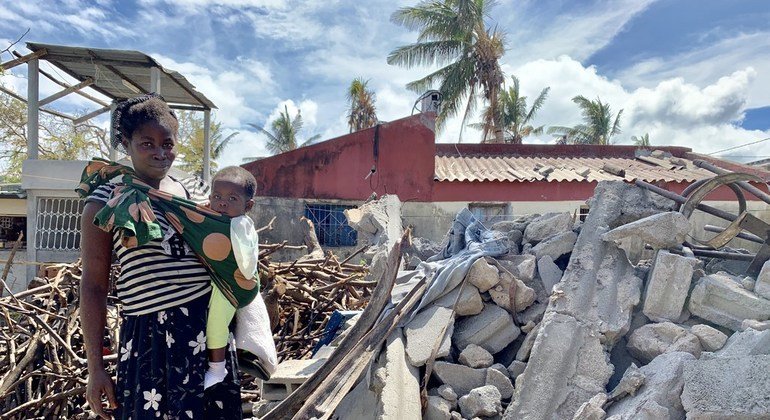Mozambique Takes Great Steps Towards Early Warning for All


In a ministerial ceremony In the capital Maputo, President Filipe Jacinto Nyusi laid out an ambitious national roadmap to achieve Early warning for all by the end of 2027.
This initiative, also known as EW4All, was first implemented announced by United Nations Secretary-General António Guterres by March 2022, with the aim of achieving universal coverage within five years.
Disaster and devastation
Mr. Nyusi – African Union Champion for Disaster Risk Management – said his country “lives under constant threat of disaster.”especially those caused by extreme natural events, of which floods, tornadoes and droughts are the most frequent.”
“When these adverse events occur, They leave a trail of devastation characterized by human loss and material and environmental damage. or serious impacts on our society and economy.”
Mozambique is located on the southeastern coast of Africa and the country is regularly exposed to tropical cyclones that sweep across the Indian Ocean, as well as associated coastal and inland flooding. World Meteorological Organization speak.
More than 60 percent of the population lives in low-lying coastal areas that rely heavily on rain-fed agriculture, increasing the risk to both infrastructure and livelihoods.
In progress
The impacts of climate change, environmental degradation due to human activity and poor land management have exacerbated these challenges, said Mr Nyusi, stressing that more could be done to reduce both the loss of life and the wider damage.
The President welcomed the work of the WMO, the United Nations weather agency, and the Mozambique National Meteorological and Hydrological Service. He also stated that significant new investment to improve basic observations of weather and climate is the basis for early warnings.
“Mozambique has taken great strides towards Early Warning for All and has a proven track record of saving lives,” said WMO Secretary-General Celeste Saulo.
She recalled that Tropical Cyclone Idai in March 2019 caused 603 deaths and $3 billion in damage, while the record-breaking Tropical Cyclone Freddy in early 2023 claimed 183 lives and caused $176 million in economic damage.
‘Early warning works’
Ms. Saulo called for building a future where Mozambique is not only prepared for hazardous events but also resilient to them.
“Let us all come together with one vision and one goal: to protect people, livelihoods and futures,” she said. “Early warnings work. They must work for everyone,” she added.
Meanwhile, WMO noted that Mozambique has taken action towards climate adaptation.
Implementation roadmap
The Early Warning for All initiative was officially launched here in November 2023 and is being implemented with the support of the National Institute for Disaster Management and the National Institute of Meteorology, in close collaboration with the National Institute of Communications, the Mozambique Red Cross and the office of the United Nations Resident Coordinator.
“The EW4All Plan provides an overarching framework for a coherent and integrated Multi-Hazard Early Warning System programme that can be incorporated into Mozambique’s five-year development plan,” WMO said.
This roadmap aims to “ covering the entire meteorological value chainfrom collecting weather and climate observation data, to better forecasting, improved early warning systems to more informed climate adaptation plans.”
Challenge and compliance
However, the UN agency points out that many challenges remain. For example, Mozambique’s National Meteorological Institute has relied on government budgets and international development projects to fund its observation network. Limited resources have hampered its ability to access and maintain the network.
Mozambique also currently lacks surface weather stations that comply with the mandatory international WMO standard, Global Basic Observation Network (GBON).
The UN agency says the situation is set to change thanks to a $7.8 million investment fromSystematic Observation Funding Facility (SOFF)Install six new ground stations, upgrade 15 existing stations and establish four airborne stations.
Invest at the right time, high profit
SOFF is a United Nations Fund that provides financial and technical support to support climate and weather data collection, and this investment aims to bring Mozambique into line with GBON standards.
Ms. Saulo called it “a timely and much-needed investment that will yield high returns,” noting that Mozambique lost 75 percent of its monitoring stations in the 2000 floods and has been struggling to recover since.
She added that the investment would contribute to the establishment of the Government’s ambitious ‘One District, One Weather Station’ programme.
“New or updated ground and airborne stations, along with technical support, will improve national meteorological and hydrological services, thereby strengthening forecasting and early warning systems that save lives and livelihoods,” she said.
Strengthening resilience and preparedness
Mozambique is one of the first countries to move into the SOFF Investment phase.
The South African Weather Service, as a peer advisor to SOFF, will provide guidance, while the United Nations World Food Programme (World Food Programme), as the implementing agency, will leverage its on-the-ground presence and ongoing projects to complement investments in early warning and forecast-based finance.
The partnership aims to facilitate repairs to stations previously funded by other initiatives but lacking maintenance due to resource constraints.
As a result, the National Institute of Meteorology will be better equipped to support Government initiatives to enhance national resilience and disaster preparedness.
CREWS Initiative
Meanwhile, tClimate Risk Early Warning Systems (CREWS) Initiativealso plays an important role in building resilience in Mozambique.
This financial mechanism funds projects in the world’s most vulnerable countries to establish early warning services.
Following Cyclone Idai in 2019, a joint WMO and World project provided international expertise to the Government-led Disaster Risk Management Programme, particularly in the development and deployment of integrated early warning systems.
The upcoming meeting of the CREWS Steering Committee will discuss a follow-up project worth $5.5 million to build on this foundation and expand efforts in Mozambique and the wider southern African region, WMO said.




